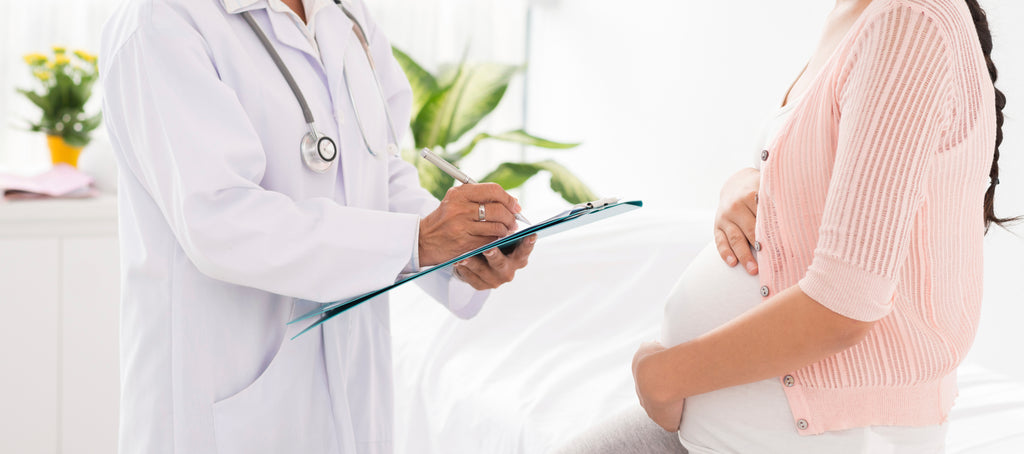Pregnancy and Varicose Veins

Becoming a mother is a wonderful time in a woman's life, but it can also be a time when, for the first time, you develop leg related problems, due to the additional weight you are carrying, and the additional pressure put on the circulatory system of your legs.
Men and women of all ages can develop varicose veins. But the special changes in your body during pregnancy make you especially susceptible to this condition. In fact, it's estimated that up to 40% of all pregnant women develop varicose veins.
When you’re pregnant, hormone changes may cause vein walls to relax slightly and stretch out. Also, greater blood flow to and from the womb, along with the size and weight of your expanding tummy, puts additional pressure on the veins of your legs.
Varicose or enlarged veins usually occur in your lower legs, but may extend into the pelvic area. They are caused by your enlarged uterus, which presses on your abdominal veins and interferes with the return of blood from your legs. Varicose veins usually shrink and disappear during the first few weeks after the baby is born. However, it is wiser to try to avoid varicose veins than cure them.
How to Avoid Varicose Veins During Pregnancy
Pregnancy Increases the Possibility That You'll Develop Varicose Veins
You can help avoid varicose veins with some of these helpful tips:
- Avoid wearing tight stockings, or socks.
- If at all possible, do not stand in one place for long periods of time.
- You're more likely to develop varicose veins if your job requires prolonged periods of standing or sitting. If your job requires you to stand, walk around at break time to improve circulation.
- If you can, sit down and put your feet up occasionally. Jobs in which you sit most of the day often aggravate varicose veins.
- Do not sit with your legs crossed or with the pressure of a chair under your knees.
- If traveling by car, take frequent rest stops and walk around. Support hose may also help you prevent varicose veins.
- Other contributing factors are thin-walled veins, injury or inflammation of the veins and excess weight. The combined effect of all of these factors contributes to varicose veins in the legs.
Early Treatment Can Prevent Temporary Problems from Becoming Permanent
If you already have varicose veins, pregnancy can aggravate and worsen the condition. Also, if your mother had varicose vein problems during her pregnancy, you may experience similar problems since weaknesses in vein walls and valves are inherited.
Usually the varicose veins that develop during pregnancy return to normal after your baby is born. However, if valves are improperly developed, there will be a tendency for varicose veins that develop during pregnancy to become permanent problems.
If you have varicose veins or swelling in your legs, lie on a bed, couch, or floor and raise your feet and legs up in the air, resting your heels against the wall. Take this position for 2 to 5 minutes several times a day.
If you have severe varicose veins, you may be advised to wear elastic stockings during the day. Support hose are not as effective as elastic stockings. Put elastic stockings on before you get out of bed in the morning, before your veins become swollen with blood. Take them off just before you go to bed. Wash them in mild soap after every wearing.
If you have varicose veins around your vaginal area, try to take frequent rest periods. Lie down with a pillow under your buttocks. This position elevates your hips and should give you some relief.
A significant body of scientific literature suggests that varicose and spider veins begin in many women during pregnancy, yet many doctors do not have the information necessary to discuss the benefits of compression support hosiery, until leg problems become severe.
Maternity Support Pantyhose - Just What The Doctor Ordered
Ames Walker offers a variety of support pantyhose for use during pregnancy. Compression pantyhose provides gradient compression, where the pressure of the garment is greatest at the ankle and decreases as you move up the leg. This unique design gently compresses your leg muscles, squeezing the veins, helping to push the blood back toward your heart.
Regular support hosiery, which might be bought in a department store or specialty maternity shop, simply does not clinically work. They may make your legs feel good temporarily due to the hugging action, but they do not help return fluids and blood back up the venous system to the heart, reducing swelling and pressure in the legs.
In order to aid circulation problems in the legs and reduce swelling and potentially aid in preventing future varicose veins, a minimum 12mmHg (a type of pressure measurement standard) pressure at the ankle is necessary. Pressure must be graduated (reduced gradually) up the leg, in order to work effectively.
If you are pregnant and beginning to see varicose or spider veins or have problems with minor leg swelling, talk to your doctor about compression support hosiery to help relieve your symptoms and possibly prevent your leg problems from becoming worse.
At Ames Walker, we have maternity compression hosiery in mild, moderate, firm and extra firm pressure levels, that you can purchase directly online.
Compression hosiery for the mom-to-be is simply good preventive medicine!

